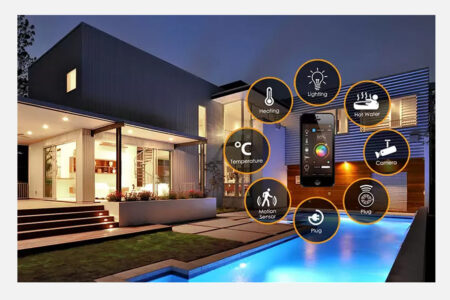- Home
- Real Estate
- Smart Home Automation: The Future of Modern Living

Smart Home Automation: The Future of Modern Living
In today’s fast-paced world, technology has seamlessly integrated into our daily lives, making everything more convenient and efficient. One of the most remarkable advancements in recent years is smart home automation.
From controlling lights with your smartphone to managing appliances through voice commands, home automation has transformed the way we live. But what exactly is smart home automation, and why is it becoming so popular?
Let’s explore this innovative technology in detail.
What is Smart Home Automation?
To begin with, smart home automation refers to the use of internet-connected devices to control and monitor household systems and appliances. These systems allow homeowners to manage functions such as lighting, climate, security, entertainment, and even kitchen appliances remsotely.
For instance, you can switch off your bedroom lights from your office or preheat the oven before you reach home. Therefore, home automation not only adds convenience but also ensures energy efficiency and enhanced security.
How Does Smart Home Automation Work?
At the core of smart home automation lies the Internet of Things (IoT). IoT enables different devices to communicate with each other via Wi-Fi, Bluetooth, or other wireless protocols.
Here’s how it works step by step:
- Smart Devices – These include smart bulbs, smart thermostats, security cameras, and voice assistants.
- Central Hub or App – A mobile application or smart hub controls all connected devices.
- Automation Settings – Users can program devices to work on schedules or respond to specific triggers.
- Remote Access – Everything can be managed through a smartphone, tablet, or even voice commands.
As a result, smart home automation creates a personalized living environment tailored to your preferences and lifestyle.
Benefits of Smart Home Automation
Now that we understand how it works, let’s move on to the benefits of smart home automation.
1. Convenience at Your Fingertips
First and foremost, the biggest advantage is convenience. You no longer need to manually switch appliances on or off. Instead, you can control them with a tap on your phone or a simple voice command.
2. Energy Efficiency
In addition, smart devices help reduce energy consumption. For example, a smart thermostat adjusts the temperature based on your daily routine, while smart lighting ensures that lights are turned off automatically when not in use.
3. Enhanced Security
Furthermore, home automation systems come with advanced security features. From smart door locks to motion-detecting cameras, you can monitor and secure your home even when you are away. This provides peace of mind and an added layer of protection.
4. Cost Savings
Another major benefit is long-term cost savings. Since devices optimize energy use, your electricity bills are reduced. Over time, the savings outweigh the initial investment in smart devices.
5. Customization and Comfort
Finally, home automation allows you to personalize your environment. Whether it’s dimming lights for movie night or adjusting the thermostat for a cozy evening, everything can be tailored to your preferences.

Popular Smart Home Automation Devices
When talking about smart home automation, it’s important to highlight the devices that make it possible. Some of the most popular ones include:
- Smart Speakers and Voice Assistants (Amazon Alexa, Google Home, Apple HomePod)
- Smart Lighting Systems (Philips Hue, Syska Smart Bulbs)
- Smart Thermostats (Nest, Ecobee)
- Smart Security Cameras and Doorbells (Ring, Arlo)
- Smart Plugs and Switches (TP-Link, Wipro Smart Plug)
- Smart Kitchen Appliances (Wi-Fi-enabled ovens, refrigerators, and coffee makers)
Each of these devices enhances convenience and contributes to building a fully automated smart home ecosystem.
Challenges in Smart Home Automation
Of course, like any technology, smart home automation also comes with a few challenges.
- High Initial Cost – Setting up a fully automated home requires investment.
- Compatibility Issues – Not all devices work seamlessly together, making integration difficult at times.
- Cybersecurity Risks – Since these systems rely on internet connectivity, they can be vulnerable to hacking if not properly secured.
- Learning Curve – For some users, adapting to new technology may feel overwhelming.
Nevertheless, as technology advances, these challenges are gradually being addressed with affordable devices, improved integration, and stronger security protocols.
The Future of Smart Home Automation
Looking ahead, smart home automation is expected to become an integral part of every household. Artificial intelligence (AI) and machine learning will make devices even smarter, predicting user behavior and adjusting settings automatically.
For example, future systems may automatically prepare your coffee when your alarm rings, or adjust lighting and temperature based on your mood. Moreover, with the growth of 5G technology, the speed and reliability of connected devices will improve dramatically.
Therefore, smart home automation is not just a trend but the future of modern living.
Tips for Getting Started with Smart Home Automation
If you’re new to this technology, here are a few tips to help you get started:
- Start Small – Begin with basic devices like smart bulbs or smart plugs.
- Choose a Central Hub – Use a single ecosystem (like Google Home or Amazon Alexa) for easy integration.
- Prioritize Security – Always use strong passwords and secure networks.
- Expand Gradually – Once you’re comfortable, add more devices such as smart cameras or thermostats.
By starting small and gradually expanding, you can build a smart home that fits your lifestyle and budget.
Final Thoughts on Smart Home Automation
In conclusion, smart home automation is revolutionizing the way we interact with our living spaces. From convenience and energy efficiency to security and cost savings, the benefits are undeniable. While there may be challenges, the advantages far outweigh the drawbacks.
As technology continues to evolve, smart homes will become more accessible, intelligent, and essential for modern living. So, if you want to experience comfort, safety, and efficiency at a whole new level, investing in smart home automation is the right choice.
Also Read: Best Main Gate Colour Combination for Your Home